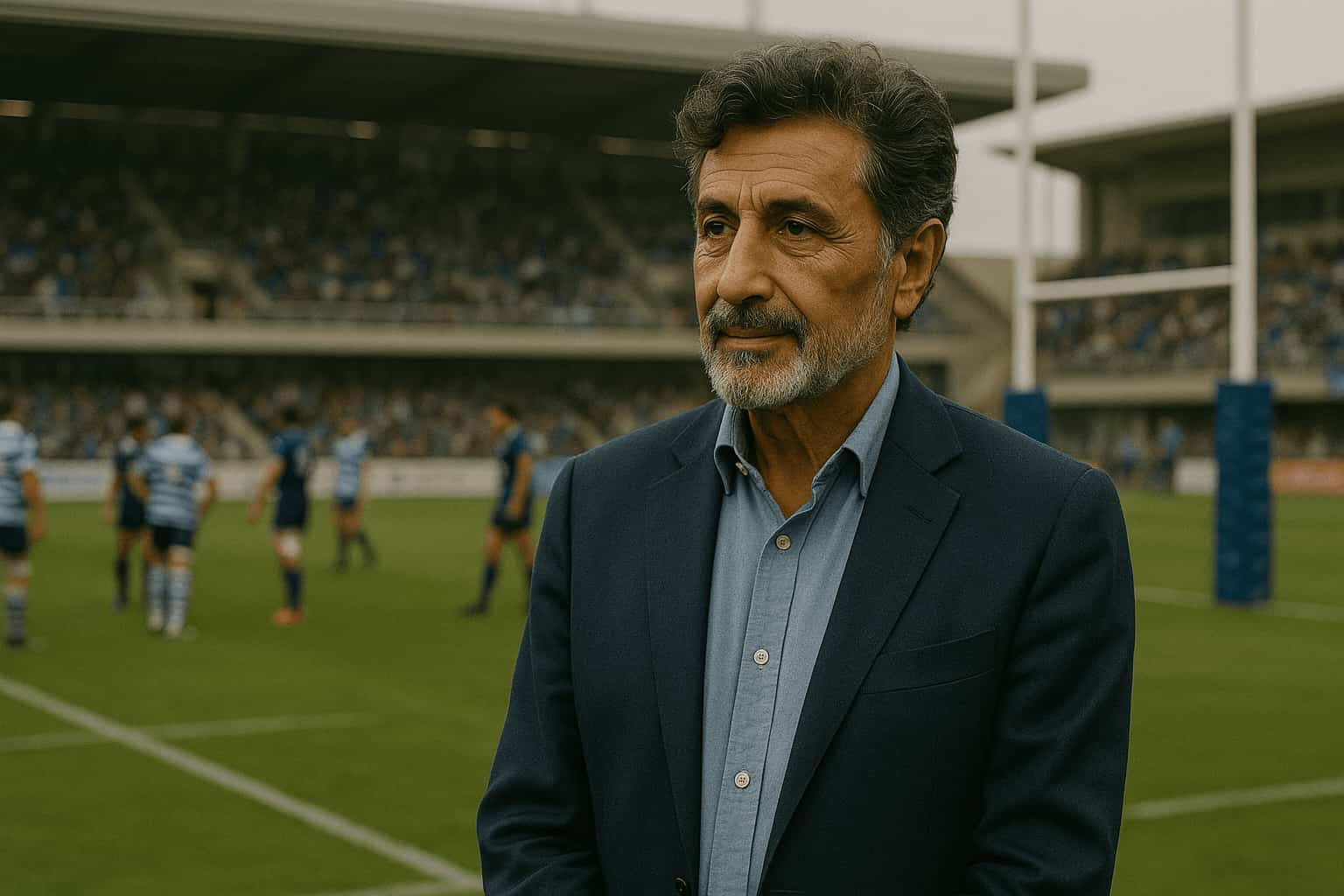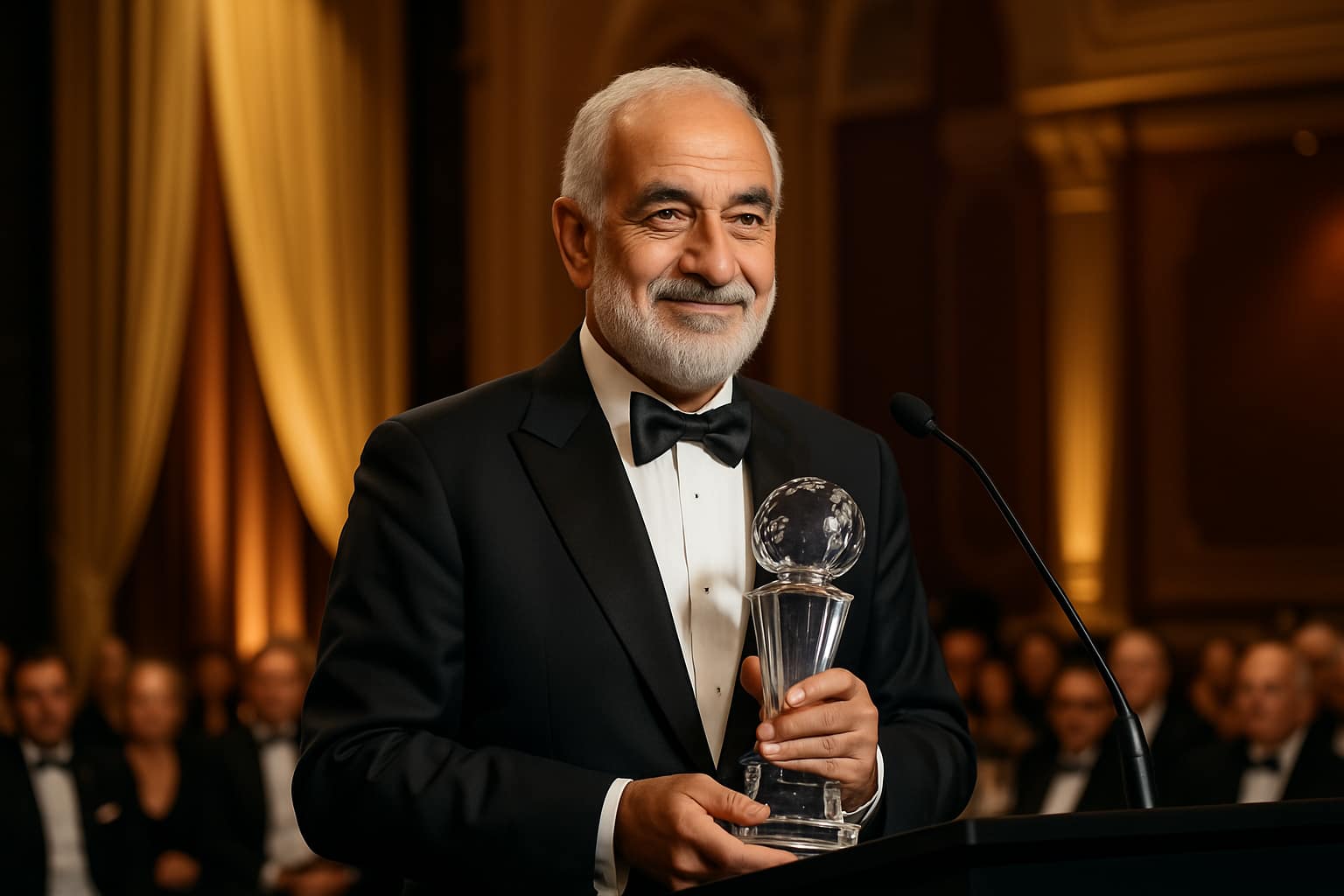Table of contents
- Early Life & Struggles
- Turning Points
- Breakthrough Success
- Key Business Moves
- From Confidence to Strategy
- A Calculated Approach to Expansion
- Respecting Identity Over Standardization
- The Human Element: A Shared Charter of Values
- Vertical Integration: Serving the Industry Holistically
- Going Global, One Culture at a Time
- Exponential Growth and a Defining Acquisition
- Cash Flow Over Debt: A Discipline That Defined Success
- Business Philosophy & Innovation
- Personal Challenges & Growth
- Rugby & Community Investment
- Global Recognition & Awards
- Current Status & Future Vision
- Legacy & Lessons Learned
- Entrepreneurial Philosophy in Practice
- The Altrad Model of Success
- Impact on French Business Culture
- Global Influence and Recognition
- Lessons for Future Generations
Mohed Altrad emerged from harsh circumstances to become France’s most successful entrepreneur. Born into a nomadic Bedouin tribe in the Syrian desert around 1948, his story reads like a fairy tale. Every chapter of his journey from abandoned orphan to billionaire demonstrates the power of education and determination.
The man who built a $5.8 billion revenue empire started life with nothing. His father, a tribal leader, showed him no love. His mother, a young woman from poverty, died on his birth day. Left to survive in the world’s most unforgiving environment, young Mohed faced challenges that would break most people.
Early Life & Struggles

Desert winds carried sand across the Syrian landscape where Mohed Altrad spent his earliest years. Born to a Bedouin tribe that wandered endless dunes, his arrival was marked by tragedy. His father held the respected position of tribal leader. This man commanded authority over their nomadic community.
However, this same leader showed no paternal instinct toward his son. The relationship between Mohed’s parents was violent and exploitative. His father had raped his mother twice. Two sons resulted from this abuse.
Tragedy struck early when Mohed’s elder brother died. Their father killed him. This violence cast a dark shadow over the household. Fear and unpredictability filled their home.
When Mohed’s mother died during childbirth, he became an orphan immediately. His paternal grandmother accepted responsibility for raising the infant. She lived in grinding poverty. Basic necessities were difficult to provide.
Her expectations for the boy were simple. He would become a shepherd. This was the traditional path of their people. Education was not part of this plan.
Schools were for other children. Not for a Bedouin boy destined to tend flocks. Yet something within young Mohed yearned for knowledge. When he saw other children attending classes, curiosity consumed him.
Unable to gain entry through conventional means, he found his own way. He pressed his face against cracks in the school wall. Through these gaps, he watched lessons unfold. Arabic calligraphy flowing across blackboards mesmerized him.
His persistence eventually paid off. School officials let him attend classes. Academic success came naturally. He quickly rose to the top of his class.
This achievement brought unexpected consequences. His classmates resented being outperformed by a shepherd boy. They decided to teach him a lesson. Their plan nearly cost him his life.
Turning Points
A Brutal Betrayal Born of Jealousy
Jealousy drives people to shocking cruelty. Young Mohed discovered this when academic success triggered a violent response from his peers. His classmates couldn’t accept that a Bedouin orphan had surpassed them intellectually. So they hatched a deadly plan.
They carried him deep into the desert. There, they dug a hole in the sand—then buried him head-first and left him to die. It was an act of breathtaking malice and a moment that could have ended his life, and his story.
The Instinct to Survive
But Mohed possessed what he later called “the instinct of life.” Through sheer determination and strength of will, he managed to wriggle free from his sandy tomb. This harrowing moment taught him that survival demanded more than intelligence—it required an unbreakable will to live.
A New Family, A New Chance

Fate intervened when a local childless couple noticed his suffering. They welcomed him into their home, offering the first real stability he had ever known. Under their care, Mohed not only recovered but flourished. With support and structure, his academic talents continued to shine.
Academic Ascent Amid Political Turmoil
His pursuit of education took him next to Raqqa—a city that, decades later, would be known as the capital of ISIS. But at the time, it was a city shaped by complex geopolitics: Syria was under the influence of both France and the Soviet Union. Despite the turbulence, Mohed’s academic excellence opened doors others could only dream of.
A Disappointment in Kiev, A Door Opens in France
Eventually, he won admission to a university in Kiev. His dreams seemed close—until he arrived and was informed the course was full. For many, that would have been a crushing defeat.
But for Mohed, it became an unexpected opportunity. Syrian authorities arranged for him to study instead at the University of Montpellier in France—one of the oldest and most prestigious academic institutions in Europe.
A Cold November and a Bold New Start
He arrived in France on a cold November evening in 1975. He carried little more than hope and determination. French was a language he did not speak, and he knew almost nothing about the culture or the country. But language barriers and unfamiliarity that might paralyze others only spurred him to work harder.
Mastering a New World
Mohed immersed himself in French life and academics. Through relentless effort and fierce discipline, he earned multiple qualifications—including undergraduate degrees in both physics and mathematics.
His academic journey reached a remarkable peak when he earned a Ph.D. in computer science—an extraordinary achievement for someone who had once been left for dead in a desert and had begun life with virtually no access to formal education.
Breakthrough Success

Academic achievement was just the beginning of Mohed’s transformation. Armed with advanced qualifications, he entered the corporate world. He quickly proved his worth. Leading French companies recognized his talents. He became a French citizen. He fully embraced his adopted homeland.
His career took an international turn. He accepted a position with Abu Dhabi National Oil Company. Working in the oil-rich emirate provided valuable experience. Crucially, it allowed him to accumulate significant savings.
The isolated nature of his work meant few spending opportunities. This allowed him to build substantial financial foundation. Entrepreneurial instincts began to stir. He co-founded a company manufacturing portable computers.
These were revolutionary devices at the time. They were roughly suitcase-sized. When this venture was sold, he found himself with more capital. His confidence in business acumen grew.
The defining moment came in 1985. He and a partner made what seemed foolish. They purchased a small French scaffolding company. The business was hemorrhaging money. It was drowning in debt.
The purchase price was symbolic. One franc plus assumption of substantial liabilities. Most observers viewed this as financial suicide. The scaffolding industry was fragmented. Small local operators dominated it. The company they bought was failing spectacularly.
However, Mohed saw potential where others saw problems. His turnaround approach demonstrated methodical thinking. Rather than dramatic changes, he focused on fundamental improvements. He introduced performance bonuses to motivate staff.
He recognized that engaged employees would be more productive. They would be more committed to success. The strategy worked brilliantly. Within months, the company generated positive cash flow. This was the first time in years.
Employees who had been demoralized by losses suddenly found purpose. They worked for a profitable enterprise. Clear leadership and achievable goals motivated them. The transformation was complete and sustainable.
Key Business Moves
From Confidence to Strategy
Success with his initial company gave Mohed Altrad both the capital and the confidence to think bigger. He recognized that the construction industry was undergoing rapid consolidation—small, local operators were being absorbed into larger organizations. Rather than wait for the threat to reach him, he chose to lead the transformation himself.
A Calculated Approach to Expansion
Mohed’s expansion strategy was methodical and disciplined. Rather than grow recklessly, he used cash generated from operations to fund acquisitions. Each potential target was evaluated not just for its financial value, but also for its cultural and organizational fit within the broader vision of the Altrad Group.
Respecting Identity Over Standardization
Unlike most corporate acquirers who impose rigid systems and rebranding, Mohed took a different path. He believed each company had its own valuable identity, shaped by its people, history, and local reputation. As a result, acquired companies retained their names and operational autonomy.
The Human Element: A Shared Charter of Values
Mohed’s approach extended beyond corporate structure—it reflected his beliefs about human nature and dignity. He developed a charter of shared values, a document that all new employees received. They were encouraged not just to accept it, but to engage with it—to offer suggestions, improvements, or even criticisms.
This charter became the cultural glue that held the rapidly expanding Altrad Group together. In an empire spanning industries and borders, shared values provided the stability that systems alone could not.
Vertical Integration: Serving the Industry Holistically
Mohed’s vision extended beyond scaffolding. He understood that construction companies needed a broad range of tools and equipment. So, he began diversifying into complementary products—wheelbarrows, cement mixers, and other essential gear.
This vertical integration made Altrad a more comprehensive service provider. It improved customer retention, opened new markets, and created multiple streams of revenue.
Going Global, One Culture at a Time

As the French market approached saturation, international expansion became inevitable. Mohed took the same principles that worked domestically and applied them across Europe and beyond. He remained respectful of local customs and business practices, allowing each acquisition to maintain its individuality while aligning with the broader Altrad mission.
Exponential Growth and a Defining Acquisition
The pace of growth accelerated. What began as a single failing company grew into an international giant. The Altrad Group came to encompass 170 companies and over 22,000 employees worldwide.
Annual revenue soared to $2 billion, with profits surpassing $200 million. A landmark moment came when Mohed doubled the size of his business through the acquisition of a major Dutch rival. This move signaled that his appetite for growth—and his capability to manage it—remained as strong as ever.
Cash Flow Over Debt: A Discipline That Defined Success
Each acquisition was funded through cash flow, not debt. Mohed avoided borrowing, believing that financial independence was essential for long-term success. This principle protected the Altrad Group from overleveraging and allowed it to grow at a sustainable pace, even during volatile economic cycles.
Business Philosophy & Innovation

Mohed’s approach to business leadership set him apart from conventional corporate executives. He believed that companies should serve humanity rather than exploit it. This philosophy emerged from his own experience of hardship and abandonment.
Every business decision reflected his commitment to human dignity. He refused to treat employees as expendable resources. Instead, he viewed them as partners in building something meaningful. This perspective created extraordinary loyalty throughout his organization.
His management style emphasized listening over commanding. He spent considerable time understanding local cultures in each market. This approach allowed him to adapt strategies while maintaining core principles.
Innovation became a cornerstone of his business model. He constantly sought new ways to serve customers better. Technology investments improved efficiency without eliminating jobs. He believed that progress should benefit everyone involved.
The company’s growth strategy focused on organic development rather than aggressive takeovers. He preferred to build relationships with acquisition targets over months or years. This patience resulted in smoother integrations and better outcomes.
Quality control remained paramount despite rapid expansion. He established rigorous standards that applied across all operations. These standards covered not just products but also employee treatment and customer service.
His commitment to excellence extended to environmental responsibility. Long before sustainability became fashionable, he implemented practices that minimized ecological impact. This foresight positioned his companies advantageously as regulations tightened.
Personal Challenges & Growth
Despite professional success, Mohed faced ongoing personal struggles. The trauma of his childhood never fully disappeared. He often spoke about feeling like an outsider, even in his adopted homeland.
Sleep rarely came easily to him. He used these wakeful hours productively, writing books and developing business strategies. His insomnia became a source of creative energy rather than a burden.
Writing provided emotional outlet and intellectual stimulation. His novels explored themes of identity, belonging, and human resilience. These works resonated with readers who faced their own challenges.
His autobiographical novel “Badawi” became particularly influential. French educators recognized its value for teaching about immigration and integration. The book’s inclusion in school curricula reached millions of young minds.
Literary success brought unexpected recognition. He received invitations to speak at universities and cultural events. These opportunities allowed him to share his message of hope and perseverance.
Family life provided both joy and complexity. As a father of five children, he worked to give them stability he never experienced. He was determined to break the cycle of abandonment that marked his early years.
His relationship with France deepened over decades. He became not just a citizen but a cultural ambassador. His success story embodied the nation’s ideals of liberty, equality, and fraternity.
Rugby & Community Investment

Mohed’s acquisition of Montpellier Hérault Rugby in 2011 surprised many observers. He had never been a rugby fan before purchasing the struggling club. However, the investment aligned with his broader philosophy of community service.
The rugby club was facing financial collapse when he intervened. Local officials approached him as a last resort. His decision to invest €20 million reflected his commitment to the region that had welcomed him.
Under his ownership, the team achieved unprecedented success. They won their first Top 14 championship in 2018. This victory brought immense pride to Montpellier and surrounding areas.
His approach to rugby management mirrored his business philosophy. He invested in player development and coaching excellence. He also improved facilities and fan experience significantly.
The rugby investment extended beyond sports into community development. The club became a source of local employment and economic activity. Youth programs introduced children to values of teamwork and discipline.
His involvement in rugby also brought challenges. In 2022, he faced corruption charges related to sponsorship deals. He received an 18-month suspended sentence and €50,000 fine. This setback tested his resilience once again.
Despite legal troubles, his commitment to rugby remained strong. He continued investing in the club and its community programs. His long-term vision extended far beyond immediate controversies.
Global Recognition & Awards

International recognition of Mohed’s achievements reached its pinnacle in 2015. Ernst & Young selected him as World Entrepreneur of the Year from 52 national winners. This honor acknowledged both his business success and innovative leadership style.
The award ceremony in Monte Carlo brought together global business leaders. His acceptance speech moved many attendees to tears. He spoke about his mother’s sacrifice and his debt to those who helped him.
Media coverage of his award brought renewed attention to his remarkable story. Journalists from around the world sought interviews. His message of hope resonated across cultural and linguistic boundaries.
Speaking engagements multiplied following his recognition. Universities invited him to address students and faculty. Business schools used his case study to teach entrepreneurship and leadership.
His influence extended into policy discussions about immigration and integration. European leaders cited his example when defending inclusive policies. His success provided concrete evidence of immigration’s benefits.
Academic institutions began studying his management methods. Business researchers analyzed his acquisition strategies and organizational culture. His approaches influenced management theory and practice.
Awards and honors continued accumulating over subsequent years. However, he remained focused on business operations and community service. Recognition served as validation rather than ultimate goal.
Current Status & Future Vision
Today, the Altrad Group stands as a testament to visionary leadership and strategic patience. The company’s $5.8 billion annual revenue supports over 22,000 employees worldwide. Operations span multiple continents and diverse markets.
Recent acquisitions have strengthened the company’s position in energy services. The purchase of Stork’s UK business and Beerenberg AS expanded capabilities significantly. These moves position Altrad for future growth in renewable energy sectors.
Mohed remains actively involved in strategic decisions despite his advancing age. He continues working long hours and traveling extensively. His energy and commitment inspire employees across the organization.
Succession planning has become increasingly important. He has developed a strong management team capable of continuing his vision. However, his personal involvement remains crucial to company culture.
The company’s financial strength provides flexibility for future opportunities. Debt-free operations allow rapid response to market changes. This independence remains a cornerstone of Mohed’s strategy.
Environmental sustainability has become a growing focus. The company invests heavily in clean technologies and sustainable practices. This commitment reflects both market demands and personal values.
Innovation continues driving growth across all business segments. Research and development investments support product improvements and new offerings. Technology integration enhances efficiency while maintaining employment levels.
Legacy & Lessons Learned

Today, Mohed Altrad stands as France’s most successful entrepreneur. His personal net worth reaches $3.6 billion. He leads a company generating $5.8 billion annually. However, his impact extends beyond financial metrics.
His approach to leadership reflects humanistic values. These emerged from his difficult childhood. Rather than viewing employees as resources, he sees them as individuals. Their happiness and fulfillment impact organizational performance directly.
The principle of financing growth through cash flow maintains independence. This approach provides flexibility during economic downturns. Strategic decisions are based on long-term value creation. Short-term financial pressures don’t drive them.
For aspiring entrepreneurs, his example provides crucial lessons. Education remains the most reliable path to opportunity. Success requires intelligence, resilience, and patience. Building sustainable business requires treating people with respect and fairness.
Perhaps most importantly, his story demonstrates that true success involves more than personal enrichment. The most fulfilling achievements create value for others. This comes through employment opportunities, community investment, or serving as an example.
His story resonates strongly in our era. Global migration and refugee crises dominate headlines. The journey from Syrian desert to French boardroom illustrates potential within every individual. Origins and circumstances don’t determine destiny.
The legacy of Mohed Altrad continues evolving. He remains actively involved in business operations and philanthropy. His journey from Syrian desert to French business pinnacle serves as enduring testament. Education, hard work, and belief in better futures transform lives.
For readers seeking their own success path, his story offers inspiration and guidance. The challenges he overcame were extraordinary. However, the principles he applied are available to anyone. Curiosity, persistence, integrity, and compassion can be embraced by all.
In a world often divided by differences, Mohed Altrad’s remarkable journey reminds us of shared humanity. It demonstrates our unlimited potential. His transformation from desert orphan to global business leader proves that circumstances don’t define us. Our responses to them do.
Entrepreneurial Philosophy in Practice
Mohed’s business philosophy extends beyond theoretical concepts into practical applications. His approach to employee relations revolutionized traditional management practices. He implemented profit-sharing programs long before they became industry standards.
Employee satisfaction surveys became regular practice across all Altrad companies. Results directly influenced policy changes and operational improvements. This feedback loop created continuous organizational evolution.
Training and development programs received substantial investment. Employees could pursue education and skill development with company support. This investment in human capital generated exceptional returns through improved performance.
Work-life balance initiatives preceded modern corporate trends. Flexible scheduling and family support programs attracted top talent. These policies reduced turnover and increased productivity significantly.
His commitment to diversity and inclusion reflected personal experience with discrimination. Hiring practices emphasized merit over background or origin. This approach created rich organizational cultures that drove innovation.
Environmental stewardship became integral to business operations. Sustainable practices reduced costs while supporting community health. These initiatives positioned Altrad as an industry leader in corporate responsibility.
The Altrad Model of Success

The Altrad Group’s success model offers valuable lessons for aspiring entrepreneurs. Patient capital deployment enabled sustainable growth without excessive risk. This approach contrasts sharply with debt-fueled expansion strategies.
Market research preceded every major decision. Understanding customer needs drove product development and service offerings. This customer-centric approach built lasting business relationships.
Quality control systems ensured consistent performance across all operations. Standardized processes maintained excellence while allowing local adaptation. This balance supported both efficiency and flexibility.
Strategic partnerships enhanced capabilities without requiring full acquisitions. Joint ventures provided market access while sharing risks. These relationships often evolved into permanent business arrangements.
Technology adoption focused on practical benefits rather than trendy solutions. Investments improved operations and customer service measurably. This pragmatic approach maximized return on technology spending.
Financial discipline remained constant throughout periods of rapid growth. Cash reserves provided security during economic uncertainties. This conservative approach enabled opportunistic investments when competitors struggled.
Impact on French Business Culture
Mohed’s success influenced broader French business culture significantly. His immigrant background challenged traditional notions of business leadership. Success demonstrated that talent transcends cultural origins.
His humanistic management style inspired other executives to reconsider their approaches. Employee-centered policies became more common across French industry. This cultural shift improved workplace conditions nationwide.
International expansion strategies developed by Altrad became models for other companies. Respectful market entry approaches succeeded where aggressive tactics failed. These methods enhanced France’s global business reputation.
His literary works contributed to cultural discussions about identity and belonging. Business leaders began speaking more openly about personal struggles and motivations. This transparency humanized corporate leadership.
Educational partnerships between Altrad and French universities created new opportunities. Scholarship programs supported students from disadvantaged backgrounds. These initiatives expanded access to higher education significantly.
His rugby investment demonstrated how business success could support community institutions. Other entrepreneurs followed his example in sports and cultural investments. This trend strengthened connections between business and society.
Global Influence and Recognition
International business schools now study Mohed’s management methods extensively. Case studies examine his acquisition strategies and organizational development. These analyses influence management education worldwide.
Speaking engagements at global conferences spread his business philosophy internationally. Audiences across continents embraced his humanistic approach to leadership. This influence extends far beyond the construction industry.
Government officials consult him on immigration and integration policies. His success story provides evidence for inclusive economic strategies. Policy makers reference his example in legislative debates.
Media coverage of his achievements reaches millions of readers globally. His story inspires entrepreneurs in developing countries particularly. This influence demonstrates the universal appeal of his message.
Charitable foundations established by Mohed support education and entrepreneurship worldwide. These organizations provide resources for disadvantaged youth globally. His philanthropy extends his impact beyond business operations.
International awards continue recognizing his contributions to business and society. These honors acknowledge both financial success and social impact. Recognition validates his approach to responsible entrepreneurship.
Lessons for Future Generations

Mohed’s journey offers timeless lessons for future entrepreneurs and leaders. Education remains the most reliable path from poverty to prosperity. Investment in learning pays dividends throughout life.
Resilience in the face of adversity separates successful people from others. Challenges become opportunities for growth and development. This mindset transforms obstacles into stepping stones.
Treating people with dignity and respect creates lasting success. Employee loyalty and customer satisfaction drive sustainable business growth. These relationships form the foundation of enduring enterprises.
Patient capital deployment enables sustainable expansion without excessive risk. Long-term thinking produces better results than short-term optimization. This approach creates value for all stakeholders.
Cultural sensitivity and local adaptation facilitate international success. Respecting differences while maintaining core principles builds trust. This balance enables global expansion while preserving organizational identity.
Giving back to communities creates positive cycles of development. Success carries responsibility to support others facing similar challenges. This obligation transforms personal achievement into social progress.
His story proves that circumstances of birth need not determine life outcomes. Determination, education, and opportunity can overcome any disadvantage. This message provides hope for people facing difficult situations worldwide.
Learn more inspiring rags-to-riches stories at The Phoenix Ascent, where extraordinary journeys of triumph over adversity come to life.
- About The Phoenix Ascent
- From Poverty to Power: The Extraordinary Rags-to-Riches Journey of Oprah Winfrey
- From Brooklyn Projects to Billion-Dollar Empire: The Extraordinary Rags-to-Riches Journey of Howard Schultz
- From Bullied Dropout to Billionaire: The Extraordinary Rise of François Pinault
- From Orphanage to Empire: The Leonardo Del Vecchio Story
Sources:
- BBC News – “Entrepreneur of the year: a Bedouin turned businessman” (2015)
- Forbes – Mohed Altrad Profile
- Wikipedia – Mohed Altrad
- Ernst & Young – World Entrepreneur of the Year 2015 announcement

